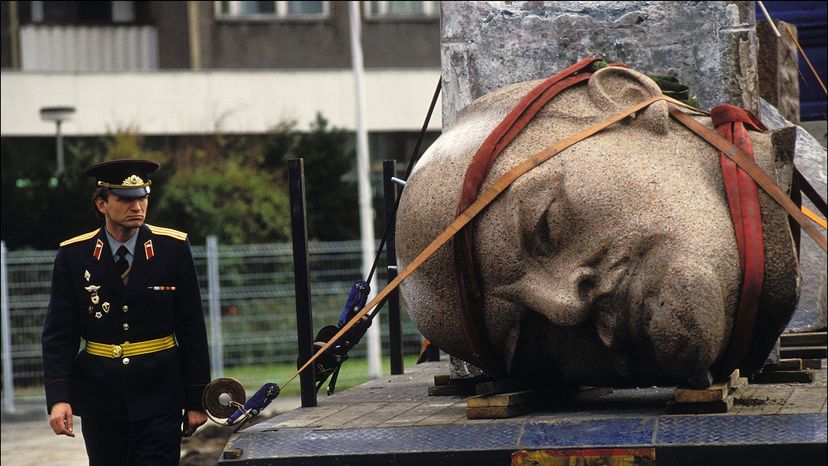The Fall of the Soviet Union

The Cold War ultimately brought the Soviet Union down, but it took nearly half a century to accomplish this goal. In 1945, around the end of World War II, the Soviet Union and United States waged this war of threatening words and fear. The Cold War was a top concern on the international affairs front. From communism opponents' perspective, its purpose was to contain communism and avoid nuclear conflict. But the Soviet Union aimed to spread communism to the United States, if not the rest of the world [source: History.com].
These two powerhouses disagreed over political, cultural and economic matters. The United States began developing retaliatory weapons, should the need to use them arise. These weapons were called the Strategic Triad and included long-range bombers, submarines and land-based missiles. This led to the first nuclear arms race, during which the two governments stockpiled as many nuclear weapons as they could in order to keep the other government in line. Luckily, nuclear war was avoided, in large part due to the scare tactics of the Cold War [source: Pifer].
Advertisement
In the 1950s, the Soviet Union and the United States engaged in the space race. Both countries wanted to be the first in space for myriad reasons, particularly because their defense and military capabilities stood to benefit from a successful space program. The space race was fueled by the ever-intensifying rivalry between the United States and the Soviet Union. The Soviet Union won that contest by launching the satellite Sputnik into orbit Oct. 4, 1957. But the U.S. was the first country to successfully land on the moon in 1969 [source: Smithsonian National Air and Space Museum].
The tension between the United States and the Soviet Union wasn't just restricted to the nuclear arms race and space race. Many Cold War-related crises erupted over the years, including the Korean and Vietnam wars, the Bay of Pigs Invasion and the Cuban Missile Crisis.
The Soviet Union's arms race, space race and continued support of the communist regime (all of which cost a lot of money) resulted in a stagnant economy with virtually no growth. When Mikhail Gorbachev was appointed to the presidency of the Communist Party in 1985, he became an advocate of change. Gorbachev laid his goals out: rejuvenate the long-lagging economy and accelerate economic development. He also advocated a policy he called glasnost ("openness") to allow more freedom of expression and freedom of information in the country.
He worked with President Ronald Reagan and the United States government to come to terms with the arms and policy disagreements that had escalated over the years. Relations between the United States and the Soviet Union improved rapidly. In 1989, the Berlin Wall (which had divided East and West Germany) fell, signifying the end of communism in East Germany. The communist governments in Czechoslovakia, Romania and Bulgaria also fell in December 1989, without any Soviet intervention to prop them up. The Cold War was effectively over [source: Encyclopedia Britannica].
In 1990, Russia elected Boris Yeltsin to the presidency. The Soviet Union officially came to an end in 1991 and split into republics (a system of government in which an elected official leads): Armenia, Azerbaijan, Belarus, Estonia, Georgia, Kazakhstan, Kyrgystan, Latvia, Lithuania, Moldova, Russian Federation, Tajikistan, Turkmenistan, Ukraine and Uzbekistan. These republics are self-governed, rather than ruled by the Soviet Union [source: U.S.-Russia Relations]. When Yeltsin resigned in 1999, he named Vladimir Putin acting president.
Since then, Putin has run the country for more than 20 years, mostly as president but also as prime minister. In 2021, he signed a law that allows him to serve two more six-year terms as president, thus changing Russia's constitution [source: Odynova]. He has shown increasingly authoritarian leadership, cracking down hard on political opponents and protesters. In 2005, he declared the collapse of the Soviet empire "was the greatest geopolitical catastrophe of the century" and a "genuine tragedy" for the Russian people [source: Associated Press]. His invasion of Ukraine in 2022 is seen by some as a first step at reclaiming that empire.